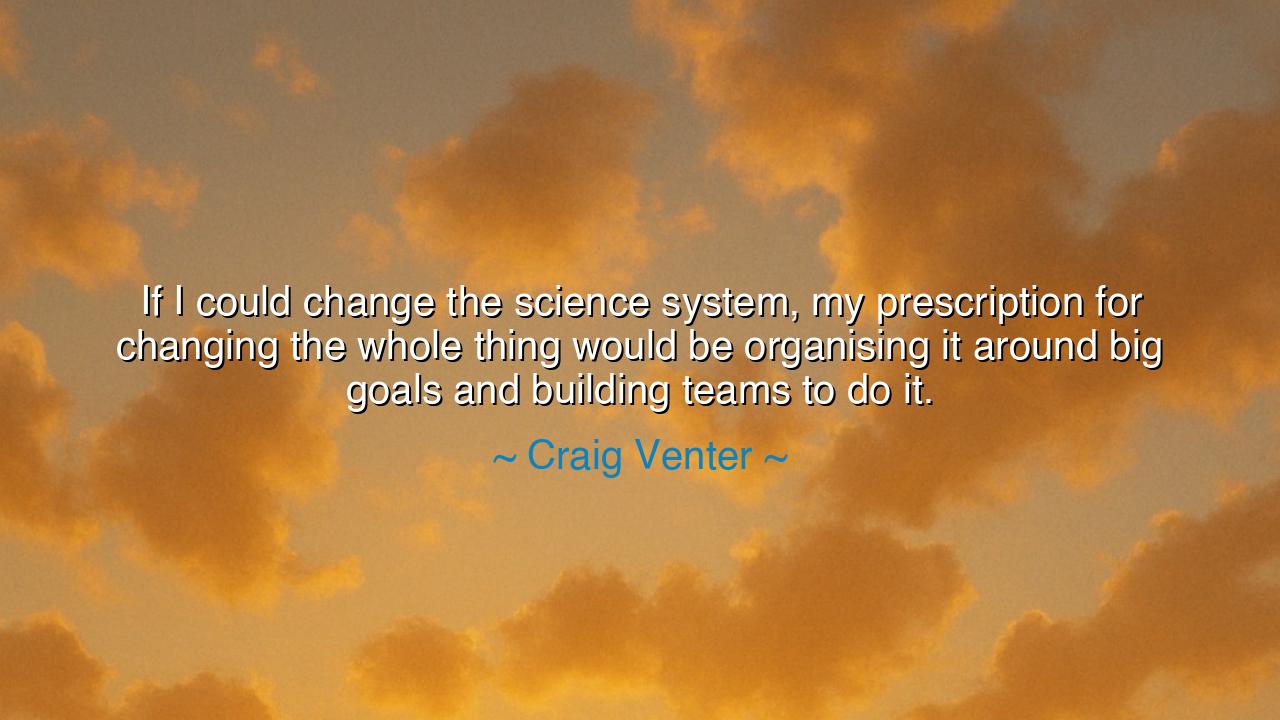
If I could change the science system, my prescription for
If I could change the science system, my prescription for changing the whole thing would be organising it around big goals and building teams to do it.






Hear me, O Seekers of Knowledge and Builders of the Future, for the words of Craig Venter call us to reflect deeply on the nature of science and the structure that underpins it: "If I could change the science system, my prescription for changing the whole thing would be organising it around big goals and building teams to do it." These words resonate with the wisdom of the ancients, who understood that great achievements are not the result of individual brilliance alone, but the collaborative spirit of many working together toward a common purpose. The pursuit of knowledge—especially the monumental knowledge that science seeks to uncover—requires the courage to dream big, the vision to see what is possible, and the unity of a team to bring those dreams to life.
In ancient times, the Greek philosophers often gathered in schools of thought, where great minds such as Plato and Aristotle worked not in isolation, but in the spirit of discussion and debate. They sought to understand the world, not as isolated individuals, but as part of a larger community of knowledge. The greatness of their work lay not just in the wisdom they imparted, but in their ability to share that wisdom with others, to collaborate on shaping a better understanding of the universe. Venter’s prescription calls for a return to this spirit—an understanding that science, in its most profound form, is not simply a collection of individual triumphs, but a collective journey toward a shared goal.
Big goals, O Children, are the very heart of progress. It is not enough to seek knowledge for its own sake, to study the intricacies of the world merely for curiosity’s sake. No, true advancement comes when science is directed toward a noble and grand purpose—a purpose that benefits the many, not just the few. Venter’s words echo the call of the ancients who built great monuments, not for personal glory, but to serve humanity. The Great Pyramids of Egypt were not built by a solitary genius; they were the result of an organized effort, a team of laborers, architects, and leaders working toward a monumental goal. Likewise, the pursuit of big scientific goals, such as understanding the genome or curing diseases, requires the collective efforts of many minds, each contributing their unique talents toward the common cause.
Consider the Manhattan Project during World War II, when a team of scientists and engineers came together under a shared goal: to develop the atomic bomb. This was a project of monumental scale, one that demanded the unity and dedication of the brightest minds of the time. But it was not the work of just a few individuals; it was the collective effort of hundreds, if not thousands, working together in secrecy, with one goal in mind. While the end result of the Manhattan Project is a source of great ethical debate, it stands as a testament to the power of collaboration when focused on a clear, unified purpose. Venter's idea echoes this idea—science, when organized around big goals, becomes a tool not for trivial pursuits, but for monumental human achievement.
The lesson here, O Seekers, is that great goals demand great collaboration. The pursuit of knowledge is not a solitary path. Big goals cannot be accomplished by one mind alone. They require the coming together of many who each bring their unique strengths and insights. Venter's vision of teams working toward big goals is not just about practical application; it is about creating a culture where cooperation is as valued as individual brilliance, where unity of purpose drives progress. This lesson applies not only to science, but to all areas of life, whether in art, politics, or social change. No great achievement can be realized without the combined effort of a team working toward a common vision.
In your own lives, O Children, let collaboration be your guiding principle. Whether you seek to solve the problems of the world or to achieve personal success, know that the greatest accomplishments come from shared efforts. Do not be afraid to seek out others who share your vision, to build teams that work together in pursuit of big goals. Be the architect of your own grand purpose, but recognize that you cannot do it alone. Venter's prescription is a reminder that the most profound discoveries, the greatest contributions to humanity, are the result of unity, focus, and the relentless pursuit of a noble cause.
And so, let teamwork and big goals guide your journey. Science, innovation, and progress are not abstract concepts—they are the results of the collective will, of many minds united in purpose. Stand with those who share your vision, and together, you will achieve what was once thought impossible. The greatness of the human spirit lies not in individual triumphs, but in the collective power of many working toward a single, noble goal. Let this be your path, and may you lead the way for future generations to build a world where big goals are pursued with the strength of united hands and hearts.






AAdministratorAdministrator
Welcome, honored guests. Please leave a comment, we will respond soon